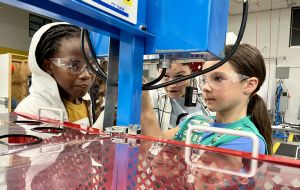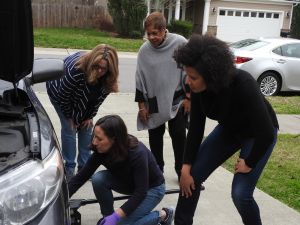
Many of the 36 projects featured in ATE Impacts 2024-2025 are testing strategies to recruit and retain populations historically underrepresented in science, technology, engineering, and math fields. Today’s blog highlights the work of three projects that focus on encouraging women and adolescent girls to embark on advanced technology careers.
“We decided to focus our projects on recruiting females and non-binary students for STEM-related educational programs to increase gender equality and overall diversity in conventionally male-dominated careers. Traditionally, female students were not encouraged to excel in math and science, which limited their access to careers that utilize these skills. Today, STEM-related careers are some of the fastest growing and highest paid jobs and our programs seek to recruit females into these academic programs,” Jacequeline I. Mitchell, director of the Business and Entrepreneurship Career Pathway at Durham Technical Community College, wrote in an email. She is principal investigator of the Power of Us: Increasing Female Enrollment and Retention in Career and Technical Education Programs at the Durham, NC, college. Power of Us offers a speaker series, female mentors, and week-long summer camps.
The Advanced Manufacturing: Girls Can, Too! Project at Bluegrass Community and Technical College (BCTC) in Georgetown, KY, is driven by these data: “70% of all high school dual credit students are female, however, only 7% of those are taking industrial maintenance courses. Meanwhile, only 12% of maintenance workers are female and 70% of maintenance workers are over 40.” Hannah Green, co-principal investigator, and Shelby Cox, administrative assistant, provided the data and reported that the project is beginning to see changes. “We have had some students enrolled in dual credit courses through their high schools, as well as some students from the Girls Can, Too! program that enrolled full time in BCTC last fall. We have found that female students excel in the courses, and we feel like we are on the right path in bridging the gender gap,” they wrote in an email.
ATE Impacts 2024-2025 will be released this spring. It is part of an Advanced Technological Education project led by the Internet Scout Research Group at the University of Wisconsin-Madison with funding from the National Science Foundation. Keep reading for more excerpts from the book and insights about effective recruitment strategies from the project teams.
Girls Can, Too! Facilitates Exploration of Manufacturing Careers
Girls Can, Too! introduces girls to women who work in industrial maintenance technology and shows them advanced technology workplaces.
“Exposing them to the companies, to the type of work they could be doing, and talking to current females in the field have been some of our most influential tactics to increasing interests and enrollment in industrial maintenance careers,” Green and Cox wrote in an email.
These in-person interactions with technicians and their work complement the project’s Saturday workshops where the girls do small projects, such as welding samples. They also work on problem-solving exercises based on actual industrial processes used by the project’s industry partners. Project leaders report these are powerful learning experiences because they allow “the girls to work hands-on with projects to prove they are capable of working in a technical career.”
The workshops also provide an opportunity for the adolescents to interact with BCTC’s industrial maintenance students. Green and Cox note this allows the girls “to see exactly what their next steps in the path are.”

Speaker Series Encourages Pursuit of Careers in Male-Dominated Fields
Power of Us: Increasing Female Enrollment and Retention in Career and Technical Education Programs at Durham Technical Community College in Durham, NC, offers a speaker series, female mentors, and week-long summer camps.
“One of the most effective forms that we use to share information about technical careers is our Power of Us Speaker Series. We asked females who are excelling in these careers to be a guest speaker in our series. Our speakers spoke about the education that led them to their current career, their work experiences, and any discrimination, biases, and microaggressions they may have experienced. We wanted our speakers to inform our students about the realities of pursuing a traditional male-dominated career field, but to also motivate and encourage them to keep moving forward,” Mitchell wrote in an email.
These female industry leaders who serve as speakers are also paired with student mentees whom they encourage toward career goals.
The project’s summer camps for female and non-binary students in grades 10 to 12 feature hands-on activities, projects, and lab demonstrations. Camp participants also receive information about various STEM career pathways including information technology, electrical systems technology, computer-integrated machining, automotive systems technology, biomedical equipment technology, and welding.
Women RISE’s Summer Program Prepares Teens to Succeed in Technology Degree Programs
Women Reinvigorating Industry Support and Empowerment (Women RISE) at Miami Dade College in Miami, FL empowers women to pursue and persist in high-tech fields that use artificial intelligence, cloud computing, cybersecurity, Internet of Things (IoT), and data analytics.
The project started the Community Alliance for Women in Technology, an organization that pairs students with mentors with whom they interact virtually.
Women RISE also offers All Hands on Tech, a summer program that is also known as the Tech Immersion Summer Program. It gives high school students the chance to explore multiple high tech careers.
In post-program surveys, 74% of the 23 student respondents reported having an increased interest in technology. Moreover, 86% of the students reported understanding the available career options in the tech industry, and 50% of them expressed a desire to pursue a college degree in technology after high school.

 Subscribe
Subscribe


 See More ATE Impacts
See More ATE Impacts

Comments
There are no comments yet for this entry. Please Log In to post one.